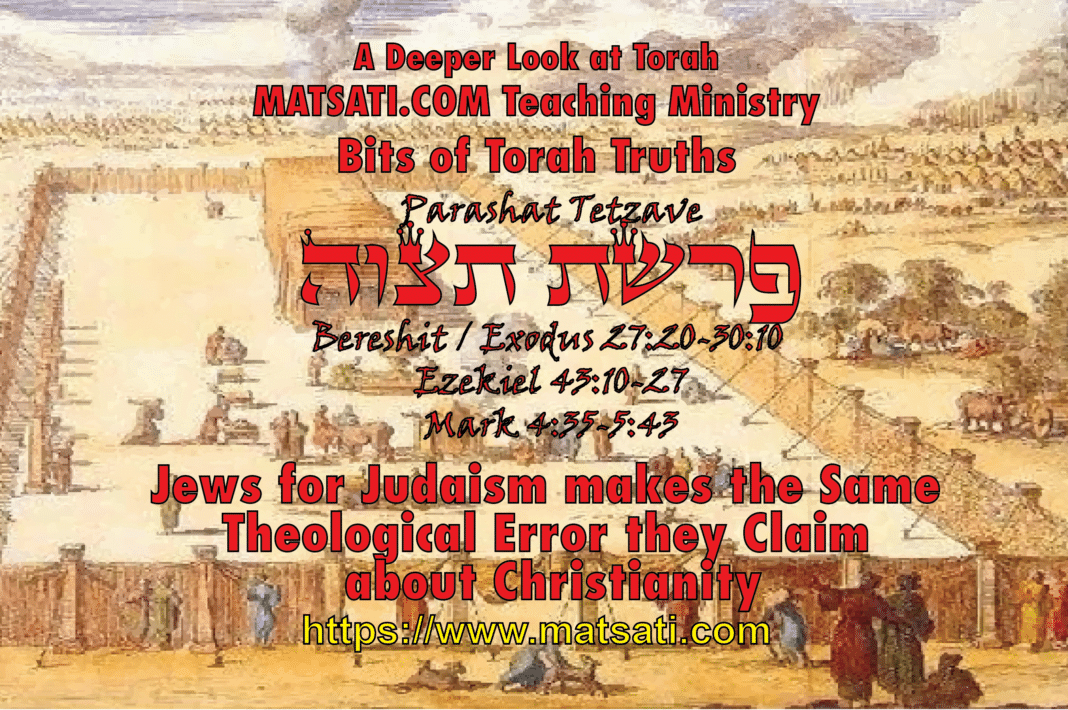There are a number of things this week’s Torah portion discusses. It begins at the end of Shemot / Exodus 27, the people are commanded to bring beaten olive oil for the menorah to keep it burning. The description on the construction of the garments of the Cohenim (Shemot / Exodus 28:1-43), the consecration of the Cohenim / priests (Shemot / Exodus 29:1-9), then the sacrifices that are to be offered in the consecration process (Shemot / Exodus 29:10-30). We also read about the portion of food for the Cohenim (Shemot / Exodus 29:31-46) and the construction of the Altar of Incense (Shemot / Exodus 30:1-10). In this week’s Torah portion I want to focus upon the consecration of the Cohenim (Priests). The first step in the process of consecration is by placing the priestly garments upon the Cohenim. The second step in the consecration process is found in the offering of sacrifices according to Shemot / Exodus 29:10, י וְהִקְרַבְתָּ אֶת-הַפָּר לִפְנֵי אֹהֶל מוֹעֵד וְסָמַךְ אַהֲרֹן וּבָנָיו אֶת-יְדֵיהֶם עַל-רֹאשׁ הַפָּר: יא וְשָׁחַטְתָּ אֶת-הַפָּר לִפְנֵי יְהוָֹה פֶּתַח אֹהֶל מוֹעֵד: 29:10 ‘Then you shall bring the bull before the tent of meeting, and Aaron and his sons shall lay their hands on the head of the bull. 29:11 ‘You shall slaughter the bull before the Lord at the doorway of the tent of meeting. (NASB) We note something about how this sentence is written, specifically the phrase, וְסָמַךְ אַהֲרֹן וּבָנָיו אֶת-יְדֵיהֶם עַל-רֹאשׁ הַפָּר “and Aaron and his sons lay their hands upon the head of the bull.” What is interesting is we are told that both Aaron and his sons are to all lay their hands down upon the head of the bull. The text is written however using the singular וְסָמַךְ instead of the plural form. According to the commentary Or HaChaim on Shemot / Exodus 29:10 Part 1, the rabbinic commentary states, “Aaron was to place his hands on the bullock and his sons were to repeat this action individually, one at a time. I have come across a Tossephta in chapter 10 of Menachot which states: ‘When five people jointly offer one sacrifice they all perform the rite of placing their hands with all their weight on the animal; they do not do this simultaneously but one after another.’” The point of these things, in the use of the singular form of וְסָמַךְ instead of the plural form suggests that each Cohen individually confessed his sins, which reveal to us how the confession of sin is something that is done on an individual basis.
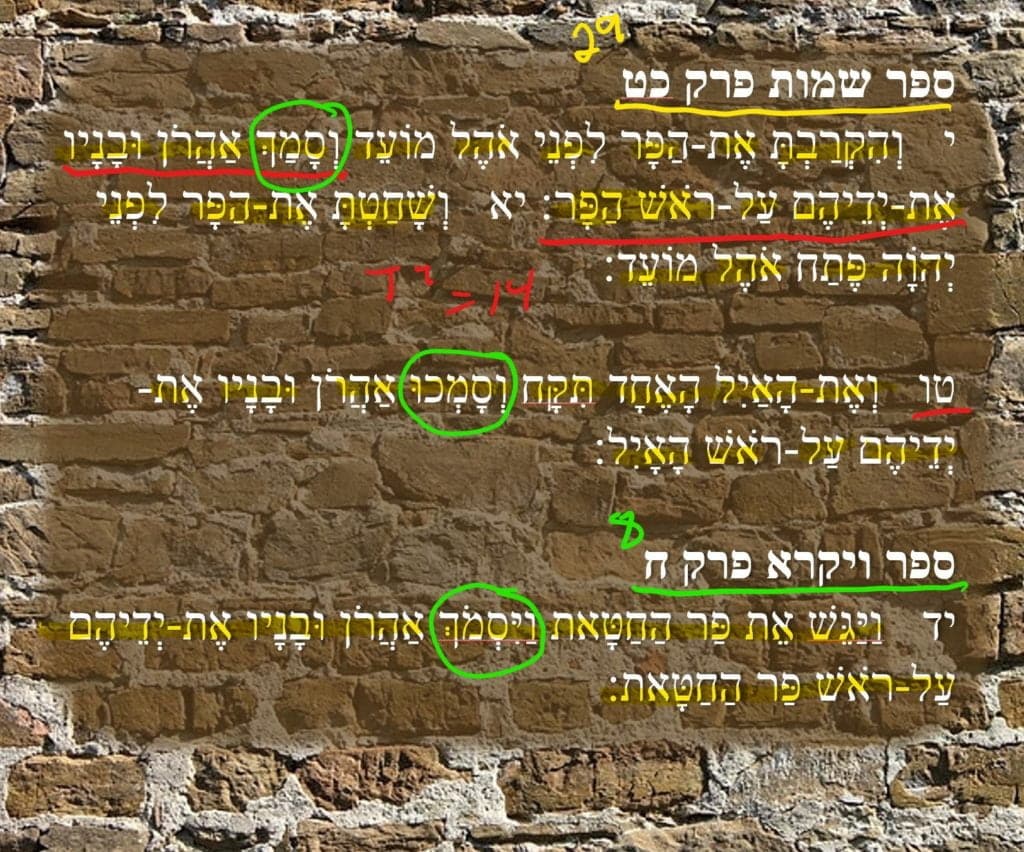
Confession is vitally important for those who believe in the God of Israel. The reason confession is so important is that it reminds us of our great need for God’s intervention in our lives because of sin. Confession is part of the Teshuvah (Repentance) process. Confession is the admission of our guilt before God and our recognizing the need for the Lord God to help us walk in the truth. Just as John wrote saying, “1:8 If we say that we have no sin, we are deceiving ourselves and the truth is not in us. 1:9 If we confess our sins, He is faithful and righteous to forgive us our sins and to cleanse us from all unrighteousness. 1:10 If we say that we have not sinned, we make Him a liar and His word is not in us.” (1 John 1:8-10) We note something very interesting, reading further Aaron and his sons also had to lay their hands upon the head of a Ram as well. Shemot / Exodus 29:15, טו וְאֶת-הָאַיִל הָאֶחָד תִּקָּח וְסָמְכוּ אַהֲרֹן וּבָנָיו אֶת-יְדֵיהֶם עַל-רֹאשׁ הָאָיִל: 29:15 ‘You shall also take the one ram, and Aaron and his sons shall lay their hands on the head of the ram; (NASB) We note in this case, the Torah is written using the plural form וְסָמְכוּ and so here in the case of the rams head, all of them, Aaron and his sons were to lay their hands on the head of the ram at the same time. Why would Moshe write that in the case of the bull each priest was to lay his hand individually, but in the case of the ram, all were to lay their hands simultaneously? We also note that according to Vayikra / Leviticus 8:14 we see the singular form used as well, וַיַּגֵּ֕שׁ אֵ֖ת פַּ֣ר הַֽחַטָּ֑את וַיִּסְמֹ֨ךְ אַהֲרֹ֤ן וּבָנָיו֙ אֶת־יְדֵיהֶ֔ם עַל־רֹ֖אשׁ פַּ֥ר הַֽחַטָּֽאת׃ 8:14 He led forward the bull of sin offering. Aaron and his sons laid their hands upon the head of the bull of sin offering, (Sefaria) The interesting part about the differences in the text I feel are related to the concept of the confession of our sins on an individual level, and the relationship our sins have in regards to a corporate level. The idea of corporate sin helps us recognize how the individual is involved or may influence (increase or decrease) someone else’s sinfulness on the group level. The idea of Aaron and his sons laying their hands down upon the ram simultaneously speaks to this and how one must also address it on this level. On the personal level, repentance is involved for the forgiveness of sins, and on a corporate level the confession and repentance from sin offers the opportunity for healing and transformation by the Lord God Almighty on a mass scale. The Lord God of Israel is powerful to heal us on both an individual and corporate level, nothing is impossible for Him!
The text that we are looking at for this week is found in Shemot / Exodus 29:10-21.
ספר שמות פרק כט
י וְהִקְרַבְתָּ אֶת-הַפָּר לִפְנֵי אֹהֶל מוֹעֵד וְסָמַךְ אַהֲרֹן וּבָנָיו אֶת-יְדֵיהֶם עַל-רֹאשׁ הַפָּר: יא וְשָׁחַטְתָּ אֶת-הַפָּר לִפְנֵי יְהוָֹה פֶּתַח אֹהֶל מוֹעֵד: יב וְלָקַחְתָּ מִדַּם הַפָּר וְנָתַתָּה עַל-קַרְנֹת הַמִּזְבֵּחַ בְּאֶצְבָּעֶךָ וְאֶת-כָּל-הַדָּם תִּשְׁפֹּךְ אֶל-יְסוֹד הַמִּזְבֵּחַ: יג וְלָקַחְתָּ אֶת-כָּל-הַחֵלֶב הַמְכַסֶּה אֶת-הַקֶּרֶב וְאֵת הַיֹּתֶרֶת עַל-הַכָּבֵד וְאֵת שְׁתֵּי הַכְּלָיֹת וְאֶת-הַחֵלֶב אֲשֶׁר עֲלֵיהֶן וְהִקְטַרְתָּ הַמִּזְבֵּחָה: יד וְאֶת-בְּשַֹר הַפָּר וְאֶת-עֹרוֹ וְאֶת-פִּרְשׁוֹ תִּשְֹרֹף בָּאֵשׁ מִחוּץ לַמַּחֲנֶה חַטָּאת הוּא: טו וְאֶת-הָאַיִל הָאֶחָד תִּקָּח וְסָמְכוּ אַהֲרֹן וּבָנָיו אֶת-יְדֵיהֶם עַל-רֹאשׁ הָאָיִל: טז וְשָׁחַטְתָּ אֶת-הָאָיִל וְלָקַחְתָּ אֶת-דָּמוֹ וְזָרַקְתָּ עַל-הַמִּזְבֵּחַ סָבִיב: יז וְאֶת-הָאַיִל תְּנַתֵּחַ לִנְתָחָיו וְרָחַצְתָּ קִרְבּוֹ וּכְרָעָיו וְנָתַתָּ עַל-נְתָחָיו וְעַל-רֹאשׁוֹ: יח וְהִקְטַרְתָּ אֶת-כָּל-הָאַיִל הַמִּזְבֵּחָה עֹלָה הוּא לַיהוָֹה רֵיחַ נִיחוֹחַ אִשֶּׁה לַיהוָֹה הוּא: [חמישי] יט וְלָקַחְתָּ אֵת הָאַיִל הַשֵּׁנִי וְסָמַךְ אַהֲרֹן וּבָנָיו אֶת-יְדֵיהֶם עַל-רֹאשׁ הָאָיִל: כ וְשָׁחַטְתָּ אֶת-הָאַיִל וְלָקַחְתָּ מִדָּמוֹ וְנָתַתָּה עַל-תְּנוּךְ אֹזֶן אַהֲרֹן וְעַל-תְּנוּךְ אֹזֶן בָּנָיו הַיְמָנִית וְעַל-בֹּהֶן יָדָם הַיְמָנִית וְעַל-בֹּהֶן רַגְלָם הַיְמָנִית וְזָרַקְתָּ אֶת-הַדָּם עַל-הַמִּזְבֵּחַ סָבִיב: כא וְלָקַחְתָּ מִן-הַדָּם אֲשֶׁר עַל-הַמִּזְבֵּחַ וּמִשֶּׁמֶן הַמִּשְׁחָה וְהִזֵּיתָ עַל-אַהֲרֹן וְעַל-בְּגָדָיו וְעַל-בָּנָיו וְעַל-בִּגְדֵי בָנָיו אִתּוֹ וְקָדַשׁ הוּא וּבְגָדָיו וּבָנָיו וּבִגְדֵי בָנָיו אִתּוֹ:
Shemot / Exodus 29:10-21
29:10 ‘Then you shall bring the bull before the tent of meeting, and Aaron and his sons shall lay their hands on the head of the bull. 29:11 ‘You shall slaughter the bull before the Lord at the doorway of the tent of meeting. 29:12 ‘You shall take some of the blood of the bull and put it on the horns of the altar with your finger; and you shall pour out all the blood at the base of the altar. 29:13 ‘You shall take all the fat that covers the entrails and the lobe of the liver, and the two kidneys and the fat that is on them, and offer them up in smoke on the altar. 29:14 ‘But the flesh of the bull and its hide and its refuse, you shall burn with fire outside the camp; it is a sin offering. 29:15 ‘You shall also take the one ram, and Aaron and his sons shall lay their hands on the head of the ram; 29:16 and you shall slaughter the ram and shall take its blood and sprinkle it around on the altar. 29:17 ‘Then you shall cut the ram into its pieces, and wash its entrails and its legs, and put them with its pieces and its head. 29:18 ‘You shall offer up in smoke the whole ram on the altar; it is a burnt offering to the Lord: it is a soothing aroma, an offering by fire to the Lord. 29:19 ‘Then you shall take the other ram, and Aaron and his sons shall lay their hands on the head of the ram. 29:20 ‘You shall slaughter the ram, and take some of its blood and put it on the lobe of Aaron’s right ear and on the lobes of his sons’ right ears and on the thumbs of their right hands and on the big toes of their right feet, and sprinkle the rest of the blood around on the altar. 29:21 ‘Then you shall take some of the blood that is on the altar and some of the anointing oil, and sprinkle it on Aaron and on his garments and on his sons and on his sons’ garments with him; so he and his garments shall be consecrated, as well as his sons and his sons’ garments with him. (NASB)
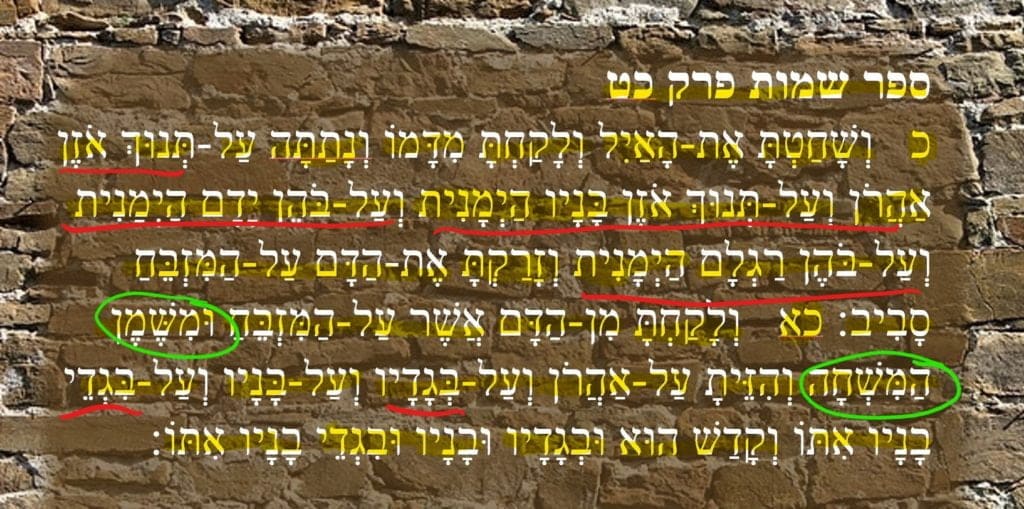
Another aspect of the consecration process, Moshe takes the blood of the slaughtered ram and sprinkles on the Cohenim for the purpose of sanctification in the service of the priesthood. Shemot / Exodus 29:20, וְשָׁחַטְתָּ֣ אֶת־הָאַ֗יִל וְלָקַחְתָּ֤ מִדָּמוֹ֙ וְנָֽתַתָּ֡ה עַל־תְּנוּךְ֩ אֹ֨זֶן אַהֲרֹ֜ן וְעַל־תְּנ֨וּךְ אֹ֤זֶן בָּנָיו֙ הַיְמָנִ֔ית וְעַל־בֹּ֤הֶן יָדָם֙ הַיְמָנִ֔ית וְעַל־בֹּ֥הֶן רַגְלָ֖ם הַיְמָנִ֑ית וְזָרַקְתָּ֧ אֶת־הַדָּ֛ם עַל־הַמִּזְבֵּ֖חַ סָבִֽיב׃ 29:20 Slaughter the ram, and take some of its blood and put it on the ridge of Aaron’s right ear and on the ridges of his sons’ right ears, and on the thumbs of their right hands, and on the big toes of their right feet; and dash the rest of the blood against every side of the altar round about. (Sefaria) Here Moshe slaughters the ram and takes from the blood and places the blood upon the right ear, thumb, and toe, and throws the remainder of the blood against every side of the altar. Shemot / Exodus 29:21, וְלָקַחְתָּ֞ מִן־הַדָּ֨ם אֲשֶׁ֥ר עַֽל־הַמִּזְבֵּחַ֮ וּמִשֶּׁ֣מֶן הַמִּשְׁחָה֒ וְהִזֵּיתָ֤ עַֽל־אַהֲרֹן֙ וְעַל־בְּגָדָ֔יו וְעַל־בָּנָ֛יו וְעַל־בִּגְדֵ֥י בָנָ֖יו אִתּ֑וֹ וְקָדַ֥שׁ הוּא֙ וּבְגָדָ֔יו וּבָנָ֛יו וּבִגְדֵ֥י בָנָ֖יו אִתּֽוֹ׃ 29:21 Take some of the blood that is on the altar and some of the anointing oil and sprinkle upon Aaron and his vestments, and also upon his sons and his sons’ vestments. Thus shall he and his vestments be holy, as well as his sons and his sons’ vestments. (Sefaria) What is interesting is how the Torah teaches that Aaron and his sons are also individually sanctified by the blood. We also read the final step in the sanctification process is by anointing with oil. We know according to the Torah that the oil represents the Holy Spirit, which speaks to how we live our lives according to the Spirit. In the commentary Akeidat Yitzchak 52:1 we read “The anointing of the High Priest also demonstrates that the two halves must be viewed at least as equal to one another. If we perfect the body to match our spirit, then we qualify for the holy oil. ‘This will be oil for a holy anointment for ME throughout your generations.’” The idea of perfecting the body to match the spirit is analogous to walking according to the Spirit. Here the rabbis connect the anointing oil to the spirit by paralleling this to our living according to the Spirit. Note this same concept when Yeshua said the spirit is willing but the flesh is weak? (Matthew 26:41) There are quite a few examples from the Scriptures that demonstrate how oil is widely understood as symbolic of God’s Holy Spirit.
This week’s Torah portion reveals to us a couple of very significant Torah based concepts that are taught in the Apostolic Writings (NT). Now something to be aware of is that these verses we are looking at for this week are not discussing the idea of blood atonement for the forgiveness of sins. These scriptures are referring to sanctification, being set apart for the service of God. The blood was used to sanctify, to make holy, to consecrate one to be ready for service unto God. There was the element of confession of sin however involved in the sacrificial system, even in this consecration process of the Cohenim (Priesthood). This Torah based principle is discussed in the NT in the following ways:
- Hebrews 13:12 Therefore Jesus also, that He might sanctify the people through His own blood, suffered outside the gate.
- Hebrews 10:14 For by one offering He has perfected for all time those who are sanctified.
- 1 Peter 1:2 according to the foreknowledge of God the Father, by the sanctifying work of the Spirit, to obey Jesus Christ and be sprinkled with His blood: May grace and peace be yours in the fullest measure.
- Colossians 1:20 and through him to reconcile to himself all things, whether things on earth or things in heaven, by making peace through his blood, shed on the cross.
- Ephesians 1:7 In him we have redemption through his blood, the forgiveness of sins, in accordance with the riches of God’s grace
- 1 John 1:7 But if we walk in the light, as he is in the light, we have fellowship with one another, and the blood of Jesus, his Son, purifies us from all sin.
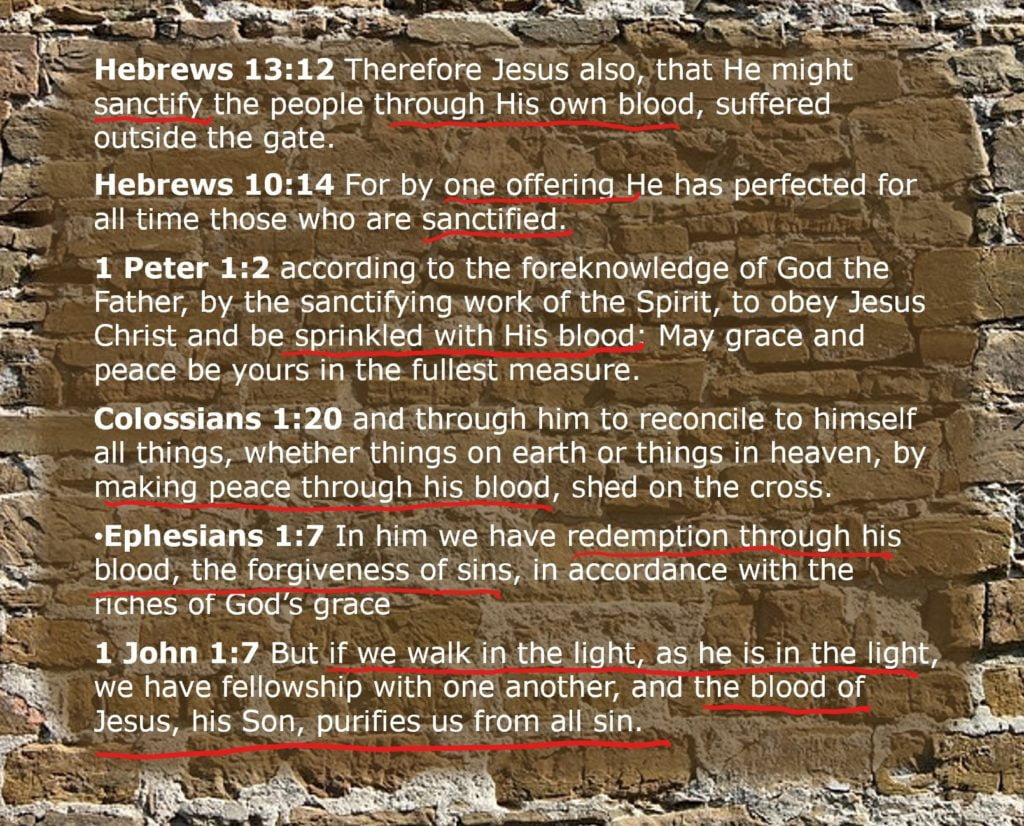
Here are a few verses from the NT that speak to sanctification by blood of Yeshua. These verses discuss the idea of the blood of Yeshua sanctifying us, redeeming us, purifying us, and making peace. This parallels what we read in this week’s Torah portion. Now because of these things that are written in the Torah and in the NT, the major theological focal point of Christianity is on the necessity for blood atonement before God which is achieved today for each individual who places his faith in Yeshua the Messiah. Jews for Judaism has written extensively on this topic, and claim that blood atonement is not the only way one receives atonement from sin in the Tanakh. In fact, they even state that one does not need blood atonement, ignoring or simply overlooking this Torah command.
One of the primary verses Jews for Judaism use to argue their point is from the Torah found in Vayikra / Leviticus 17:11.
ספר ויקרא פרק יז
יא כִּי-נֶפֶשׁ הַבָּשָֹר בַּדָּם הִוא וַאֲנִי נְתַתִּיו לָכֶם עַל-הַמִּזְבֵּחַ לְכַפֵּר עַל-נַפְשֹׁתֵיכֶם כִּי-הַדָּם הוּא בַּנֶּפֶשׁ יְכַפֵּר:
Vayikra / Leviticus 17:11
17:11 ‘For the life of the flesh is in the blood, and I have given it to you on the altar to make atonement for your souls; for it is the blood by reason of the life that makes atonement.’ (NASB)

If we study this section of the Torah, we note that this passage is also about not consuming blood. The emphasis is made on why we are not to drink blood, and the reason is the blood was given for atonement for sins. Note how we are told parenthetically that the reason for this prohibition is that the blood contains the vitality of the animal (נֶפֶשׁ הַבָּשָֹר בַּדָּם הִוא, see Bereshit / Genesis 9:4, Devarim / Deuteronomy 12:23). The idea is when one brings an animal sacrifice, its blood serves as the atoning agent. No other part of the animal functions as the blood does.
Now we need to point out that Jews for Judaism does make a good point concerning the Scriptures that state blood sacrifices were not the only path to atonement. The Scriptures reveal other ways the people were forgiven, for example, we read that incense served to atone for the people according to Bamidbar / Numbers 16:46-47. In addition to this, giving charity was described as making atonement for the soul (see Shemot / Exodus 30:15-16 and Bamidbar / Numbers 31:50). Another important point is that the sacrifices were only brought for “unintentional sins” in the sense that someone did not know he or she had sinned before God. The Torah states sacrifices were not effective for atonement of intentional sin according to Vayikra / Leviticus 4 and Bamidbar / Numbers 15:22-31. Note this is exactly what the author of the book of Hebrews writes according to Hebrews 10:26-29, 10:26 For if we go on sinning willfully after receiving the knowledge of the truth, there no longer remains a sacrifice for sins, 10:27 but a terrifying expectation of judgment and the fury of a fire which will consume the adversaries. 10:28 Anyone who has set aside the Law of Moses dies without mercy on the testimony of two or three witnesses. 10:29 How much severer punishment do you think he will deserve who has trampled under foot the Son of God, and has regarded as unclean the blood of the covenant by which he was sanctified, and has insulted the Spirit of grace? (NASB) We note the same language used here in the Torah, where for intentional sin there is no atonement in the blood of the sacrifice (i.e. Yeshua). We cannot say that we can continue sinning because the blood of Yeshua will atone. That is an unrepentant life, and there is no atonement when one lives this way.
On the topic of other things atoning for sin outside of the blood of the sacrifices, we read the following verses:
- Jeremiah 36:3 “That every man will turn from his evil way, then I will forgive their iniquity and their sin.”
- Isaiah 55:7 “Let the wicked forsake his way, and the unrighteous man his thoughts, and let him return to the Lord, and He will have compassion on him; and to our God, for He will abundantly pardon.”
- Tehillim / Psalm 32:5 “I acknowledged my sin to You, and my iniquity I did not hide; I said, `I will confess my transgressions to the Lord’, and You did forgive the guilt of my sin.”
- Mishley / Proverbs 16:6 “By loving kindness and truth iniquity is atoned for…”
- Job 22:23-27 “If you return to God you will be restored; if you remove unrighteousness far from your tent…then you will delight in God…”
- Tehillim / Psalm 37:27, Ezekiel 33, Zechariah 1:3, Jeremiah 26:13 “Depart from evil, and do good, so you will abide forever.”
- 2 Chronicles 7:14 “And if My people who are called by My name humble themselves and pray, and seek My face and turn from their wicked ways, then I will hear from heaven, will forgive their sin, and will heal their land.”
- Ezekiel 18:21-22, 18:27, 18:30 “‘But if the wicked man turns from all his sins which he has committed and observes all My statutes and practices justice and righteousness, he shall surely live; he shall not die. 18:22 ‘All his transgressions which he has committed will not be remembered against him; because of his righteousness which he has practiced, he will live… ‘Again, when a wicked man turns away from his wickedness which he has committed and practices justice and righteousness, he will save his life… 18:30 ‘Therefore I will judge you, O house of Israel, each according to his conduct,’ declares the Lord God. ‘Repent and turn away from all your transgressions, so that iniquity may not become a stumbling block to you.”
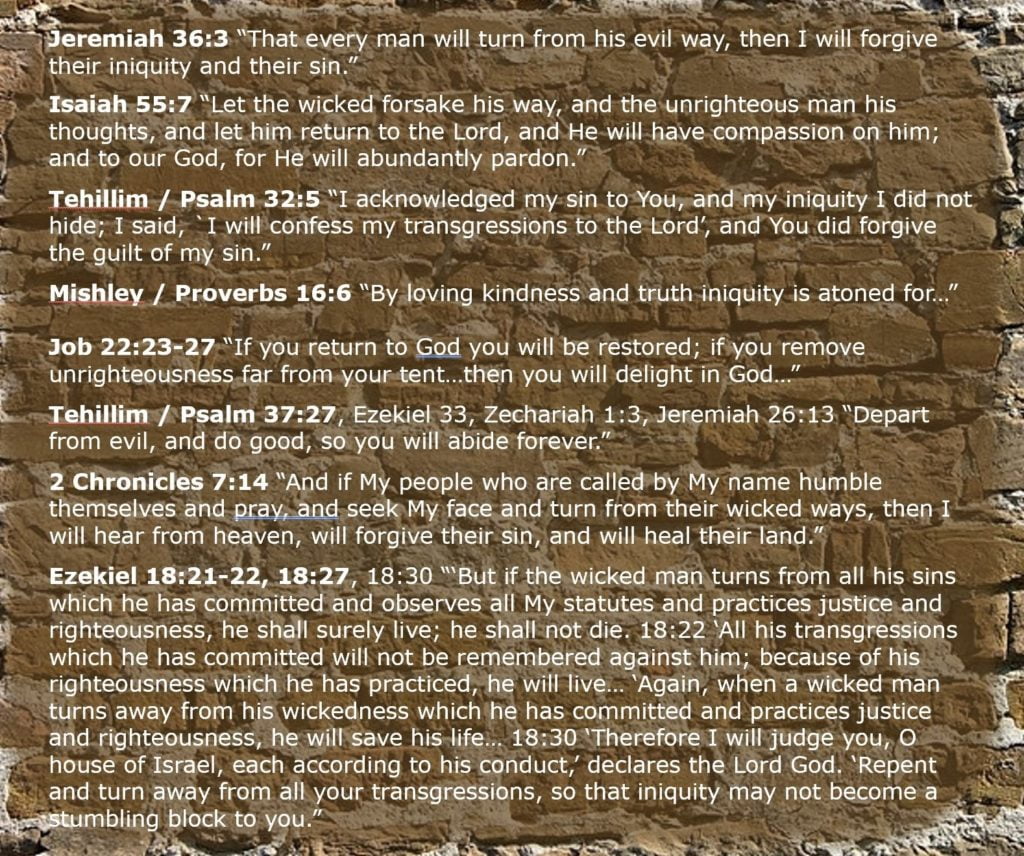
The central teachings that we receive from these Scripture is a significant one. These Scriptures reveal that atonement is not simply about the blood. This is the point that Jews for Judaism is making and this is a correct assessment. We cannot simply believe upon Yeshua and believe his blood was shed for our sins and we are good to go. The central teaching here is about the importance of our breaking with our past and having a sincere turning in repentance from sin. This must be coupled with blood atonement in order to restore our relationship with God. The idea is if I go off the path, I must turn myself back to the way of God to get back on track, and I need God’s help to do this. Notice how in the sacrifices, atonement was not effectual unless one repented and turned from his sin. Sacrifice is definitely part of the process, but for atonement to be effectual, one just perform Teshuvah (Repentance) returning to God by forsaking our evil ways and praying asking for forgiveness. This is the major teachings we derive from the Prophets as calling Israel to repent and turn from their sins. The people at that time thought the sacrifices were the central element of atonement. This is why we see in various places God saying that He desires mercy rather than sacrifice. (Hosea 6:6, 1 Samuel 15:22, Isaiah 1:11, Jeremiah 4:22, Tehillim / Psalms 40:6, Mica 6:8, Matthew 9:13, 12:7, Mark 12:33) What we learn from these things is that faith and a life change must also accompany our faith in Yeshua the Messiah! Notice how these are coupled, we can not isolate one from another. Now Jews for Judaism teach that only faith, repentance, and charity are necessary for atonement, and that blood is not necessary. Notice how this the very same theological error they are making in their claim of Christianity saying Christianity only requires the blood. This is a significant deficiency in the teaching points of Jews for Judaism, who based their proof by isolating faith, repentance, deeds of charity outside of the rest of Scripture saying these are the only things necessary and effectual for atonement, where blood is not necessary. They have a number of articles making this major theological error! When we read teachings online, even teachings from this website (MATSATI.COM), one must be very careful and critical of everything to ensure what is being taught lines up with the Scriptures. And do not get confused between a theology as opposed to what the Scriptures actually state! My point is when we consider all of Scripture we must also include the blood, and without blood there is no atonement. Again, we must pay careful attention to what is being taught in the Tanakh and the NT because their is a caveat here, one must also be repentant and turn from sin, and must also have a changed life which is represented by the deeds of charity, etc.
The things this week’s Torah portion draws out for us is on the importance of the blood for sanctification purposes. Aaron and his sons, and all of the people of Israel were sanctified by the blood of the covenant to be obedient to God’s Word. We who serve under the Messiah Yeshua are also sanctified by the blood of Yeshua to be obedient to God’s Word as well! Note this is what Paul wrote according to Romans 16 saying, 16:25 Now to Him who is able to establish you according to my gospel and the preaching of Jesus Christ, according to the revelation of the mystery which has been kept secret for long ages past, 16:26 but now has been disclosed, and through the Scriptures of the prophets, in accordance with the commandment of the eternal God, has been made known to all the nations, leading to obedience of faith; 16:27 to the only wise God, through Jesus Christ, be the glory forever. Amen. (NASB) Notice something here, Paul speaks about the prophets, the command of the eternal God to all of the nations, and “obedience” that comes from faith. This sounds a lot like what we have studied previously on God offering His Torah to all nations and people and tongues. Paul’s claim though is that was a hidden mystery which was and is revealed in Yeshua the Messiah. He concludes the book of Romans speaking of obedience to the faith, to Torah the instruction of God, as being the outcome of our faith in the Messiah! Notice how these three verses are consistent with both of the claims of Christianity and Judaism. The caveat, or point of reconciliation is that we cannot isolate scripture. We are not to pick and choose what works best for our faith. This seems to be what was happening in the history of Israel on the sacrifices and what is happening with Jews for Judaism. When we ignore or disregard the significant portions of the Scriptures (i.e. blood atonement), we end up creating a god of our own making. This then leads to both having faith and living in a way that is not pleasing to God. The outcome of isolating Scripture is to serving a god that doesn’t exist, and failing to serve the One true God in heaven, the God of Israel!
